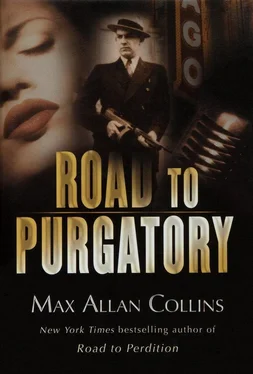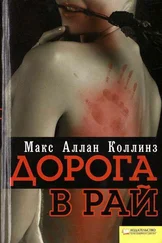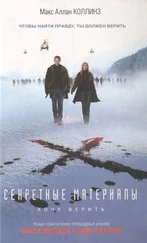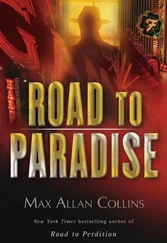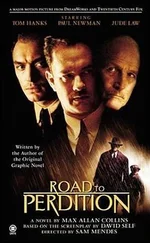When the labor pains for their first child had come, Annie had been carried by her husband like a bride over the threshold up the hill to St. Anthony’s on Thirtieth Street. They had no car at that time, nor phone, and no neighbors did, either. Despite the pain she’d suffered, her memory of the event was a warm one — held in the loving arms of her husband, as he stepped gingerly over the railroad tracks, and strode up the hill, to save her and their son.
John Looney had paid off their doctor’s bills. Rumor had it that Mr. Looney, shortly thereafter, contributed to the hospital’s new wing, in gratitude for the hospital’s policy of never turning away the residents of Greenbush.
Certainly John Looney had been kind to their little family; he was like a grandfather to Michael, Jr. (much of the train set had been Mr. Looney’s doing), and looked upon Annie with affection, always with a wistful remark about how she reminded him of his late wife. From time to time, they had entertained Mr. Looney in their home, and the patriarch’s praise for her cooking was effusive and apparently genuine.
Annie always made a point of inviting Mr. Looney’s son, Connor, but never had Connor accepted. She had noted a certain tension where Connor Looney was concerned, and suspected the man resented his father’s regard for her husband. Mr. Looney’s son, a little older than Michael, had a snake’s smile and awful dead eyes. That he and Michael often worked together gave her many an uneasy night.
Definitely, the pages of her storybook life were frayed, here and there. Just last month, her son had sat in his short pants on the couch, bouncing, kicking his feet up, looking across his trains at his mother, who was seated with a novel by Gene Stratton Porter, her feet up on the ottoman.
“Papa has a gun,” Michael said.
“Yes, he does, dear.”
“Why does Papa have a gun?”
“He protects Mr. Looney.”
“What is ‘protects’?”
“Keeps him from harm.”
“Mr. Looney’s nice.”
“Yes, dear.”
“Nice man.”
“Yes, he is, dear.”
The boy bounced. “At church? Tommy said his mama said Mr. Looney’s the boogeyman.”
She managed not to smile. “Well, he’s not, dear.”
“Boogeyman can’t be hurt.”
“I suppose not, dear.”
“So why does Papa need a gun?”
“Play with your trains, dear.”
Though amused by this exchange, Annie had also been troubled. She’d spoken about it, after supper, to Mike, who said he would talk to the boy, and make sure his son knew the gun was not a toy.
“You keep that thing under lock and key,” she said, in a rare scolding tone, “when it’s not on your person.”
“I will,” he promised.
Mike had been as good as his word, talking to their son, showing him the weapon, comparing it to a toy gun the boy had; and had been extremely discreet about the pistol, thereafter. He wore it to work, and then removed it and locked it away in a bedroom drawer, when he got home.
Occasionally Mike traveled; sometimes he was gone for as much as a week. Nothing was said about why, save for possibly, “A friend of Mr. Looney’s needs help.” But in his absence, flowers would be delivered to her, the message always the same: “To Annie from your loving husband.”
When Mike got home, Annie was still seated in the living room. Tall, broad-shouldered, somber, Mike bestowed a tiny smile upon her — but she could read something in it. A tiny sign of something, if not wrong, then... out of the ordinary.
He removed his topcoat and hat, hung them in the front closet. He motioned upstairs, meaning that he was about to proceed with the ritual of disposing of his gun and shoulder holster in their bedroom, and she nodded.
Soon, in his shirtsleeves but with his tie still on, looking like a shopkeeper in his suspenders, Mike deposited himself on the couch where not so long ago his son had been, brimming with questions about “Papa’s gun.”
Sitting forward, eyes earnest, clasped hands hanging between bowed knees, Mike said, “I’m asking Miss Murphy to stay with you, this evening.”
“Is that necessary?”
“I’m afraid I have to go out.”
“It’s not your poker night, is it?”
“Mr. Looney business.”
“Oh.” She shrugged. “No need, Mike. We’ll be fine, alone. As long as you’re not gone long.”
“I’m not sure how long I’ll be gone. Could be late. You never know with these things.”
She knew enough not to ask for a definition of “these things.”
“Well,” Annie said, “perhaps we would be better off with Mary Jane here. Just in case.”
“With you due so soon, I hate not to be here.”
“I know, darling.”
“If I ever thought I’d let you down...”
“You never have and you never will. We’ll be fine.”
He raised one eyebrow. “Oh, in Mary Jane’s capable hands, I’m sure you will be... If you have a problem, call the hospital number. I’ve made arrangements for an ambulance to come pick you up.”
“Don’t be silly.”
“Nothing silly about it. I don’t want anything to happen to you.”
Or to our baby , she thought. But it went unsaid.
“Shall we have a walk before dinner?” Annie asked.
“Are you up to it?”
“I have to get some fresh air or I’ll die.”
“The park is out of the question.”
“I know. Just up and down the block.”
His smile was mocking, in a nice way. “I could just sit here and bask in the bouquet of your corned beef.”
“Mary Jane cooked it.”
A week ago he’d have made a face; but Annie had been schooling the girl. “If she sticks to your recipe, we’re a cinch for a feast.”
They walked down toward the corner, slowly, Annie just trundling along, her gloved hand in his, her fur-collared coat not buttoned around her (that would have been an impossibility), him in his topcoat but without the fedora. In the spring or summer, the street was lushly lined with trees; now, in winter’s final days, their skeletal branches silhouetted themselves eerily against a dusk-tinged sky.
“Please be careful tonight,” she said.
“It’s just business.”
A car rumbled by over the brick street.
Then she commented, “We’re saving money, you know.”
He nodded.
“Nice nest egg,” she said.
They were at the corner now. Stopped and looked at each other, breath smoking. “We could go somewhere else,” she said. “Live somewhere else.”
He frowned slightly, just the faintest hint that her words had hurt him, somehow. “I make a good living.”
“Oh, I know.”
“Don’t you love your house?”
“I never dreamed we could live like this.”
He shrugged. “Then let’s go home.”
Shortly, they were enjoying Mary Jane’s corned beef and cabbage, or most of the family was. Young Michael, recently graduated from high chair to oak youth chair, just picked at his food, which his mother had cut into small pieces.
“Too salty,” the boy said.
“Just eat half of it,” his mother said.
“It’s nasty.”
Mike looked sharply at his son.
The boy lowered his gaze, which brought his eyes in closer proximity to the corned beef, and he shuddered.
“I can’t help it,” the boy said. His lower lip extended; his chin crinkled in a familiar preamble...
“If you cry in your food,” his father said matter of factly, “you’ll only make it more salty. Eat half of it. It’ll grow on you.”
The boy frowned in horror. “Grow on me?”
His mother covered her smile with a napkin.
“I mean,” his father said, “someday you’ll acquire a taste for it. You’ll like it when you’re a man.”
Читать дальше
